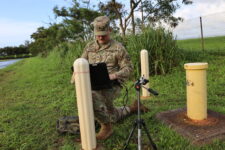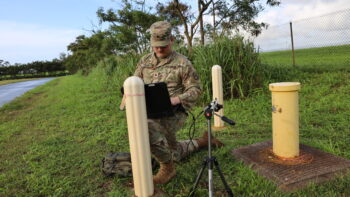
Spc. Acxel Budet Gonzales, Papa Company, 244th Quartermaster Battalion, takes a phone call while awaiting bus transport to his unit during Holiday Block Leave return processing Jan. 3 at the MacLaughlin Fitness Center.
DoDIIS 2024 — Airmen and Guardians will soon be able to access their official military accounts and securely connect to the Pentagon’s Non-classified Internet Protocol Router Network (NIPRNet) from their personal mobile devices through Hypori’s Halo software.
On Tuesday Hypori CEO Jared Shepard told Breaking Defense the Department of the Air Force will start gaining access to Hypori Halo on Nov. 15. A spokesperson from the DAF confirmed in an email that the transition to the mobile tech began in mid-October “with the process being initiated in phases over several weeks.”
“With the Air Force deploying Hypori as part of the Workspace Anywhere program, we empower airmen and air guardsmen to interact securely with government CUI [controlled unclassified information] data from their own devices — whether at home, on the go, or even during their kids’ activities,” Shepard said.
“As global threats rise, it’s crucial that our personnel have confidence in their mobile solutions to maintain mission readiness without compromising security,” he added.
In August, Hypori was awarded a $4.1 million contract to provide 10,000 licenses of Hypori Halo to the DAF. Since then, more DAF service members have shown interest in registering for the program, Shepard said.
The DAF’s adoption of the Halo software comes after it underwent a trial of Hypori’s Workspace Anywhere program, which ended in March. Before that, some Army service members adopted Halo in line with a new policy requiring secure virtual desktop access for soldiers, Guardsmen and Reservists, which included the option to use Halo on their mobile devices. The Army currently has 50,000 Hypori licenses, Shepard said.
The Air Force will be looking for a smoother rollout than the Army’s, in which some Reserve and Guardsmen said they felt left behind, as Breaking Defense previously reported. At the time, the Army expressed confidence that the virtual platforms, including Hypori, worked for the majority of users.
According to Shephard, the Halo software ensures that the user’s private data stored elsewhere on their personal devices is inaccessible to the government, and none of the activity done while using the Halo software is stored on the user’s personal device.
Additionally, Shepherd said that the software is designed around zero-trust access, meaning the software assumes that no user trying to access the platform should have free rein of the network, and users have to go through particular verification processes. This is all done on a Level 5 cloud environment — the most secure environment for controlled unclassified information.
As DAF users start to migrate onto the Halo platform, Halo is transitioning from a platform-as-a-service model with Microsoft’s Azure cloud to a software-as-a-service model with Amazon Web Service’s cloud.
“From a performance standpoint, that means that each individual is actually getting dedicated processing power and compute power in their virtual device. So it’s going to significantly improve performance. It reduces late latency and lag and touch latency,” Shepard said.






















